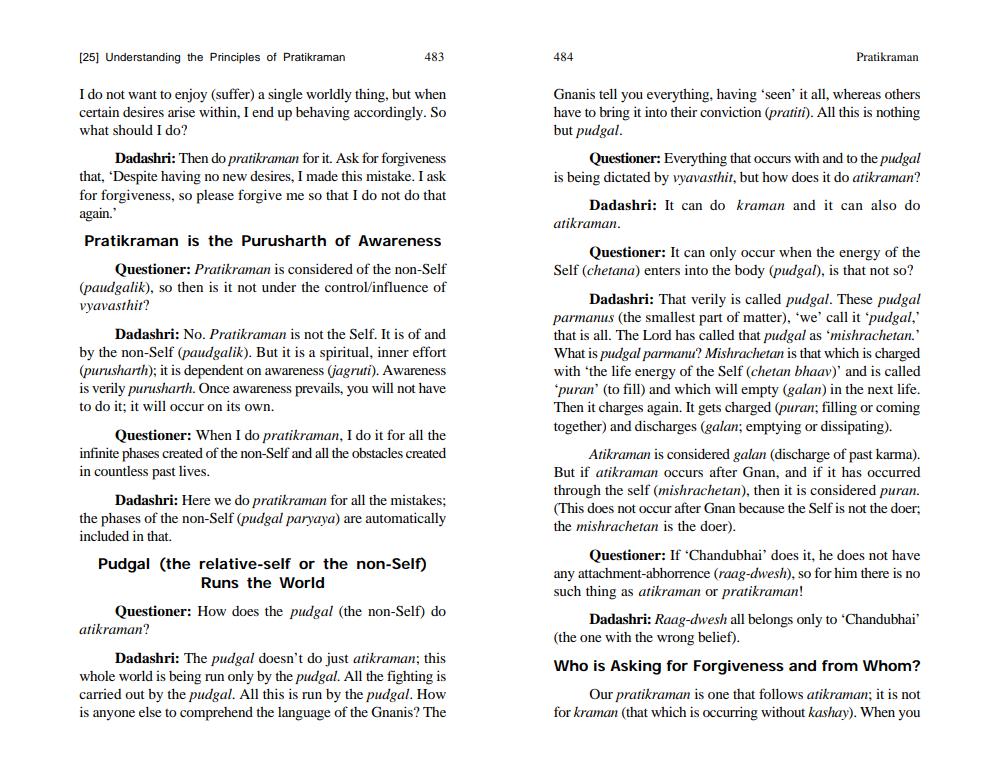________________
[25] Understanding the Principles of Pratikraman
483
484
Pratikraman
I do not want to enjoy (suffer) a single worldly thing, but when certain desires arise within, I end up behaving accordingly. So what should I do?
Gnanis tell you everything, having seen it all, whereas others have to bring it into their conviction (pratiti). All this is nothing but pudgal.
Questioner: Everything that occurs with and to the pudgal is being dictated by vyavasthit, but how does it do atikraman?
Dadashri: It can do kraman and it can also do atikraman.
Dadashri: Then do pratikraman for it. Ask for forgiveness that, 'Despite having no new desires, I made this mistake. I ask for forgiveness, so please forgive me so that I do not do that again. Pratikraman is the Purusharth of Awareness
Questioner: Pratikraman is considered of the non-Self (paudgalik), so then is it not under the control/influence of vyavasthit?
Dadashri: No. Pratikraman is not the Self. It is of and by the non-Self (paudgalik). But it is a spiritual, inner effort (purusharth); it is dependent on awareness (jagruti). Awareness is verily purusharth. Once awareness prevails, you will not have to do it, it will occur on its own.
Questioner: It can only occur when the energy of the Self (chetana) enters into the body (pudgal), is that not so?
Dadashri: That verily is called pudgal. These pudgal parmanus (the smallest part of matter), 'we' call it 'pudgal, that is all. The Lord has called that pudgal as 'mishrachetan.' What is pudgal parmanu? Mishrachetan is that which is charged with the life energy of the Self (chetan bhaav)' and is called *puran' (to fill) and which will empty (galan) in the next life. Then it charges again. It gets charged (puran; filling or coming together) and discharges (galan; emptying or dissipating).
Atikraman is considered galan (discharge of past karma). But if atikraman occurs after Gnan, and if it has occurred through the self (mishrachetan), then it is considered puran. (This does not occur after Gnan because the Self is not the doer, the mishrachetan is the doer).
Questioner: When I do pratikraman, I do it for all the infinite phases created of the non-Self and all the obstacles created in countless past lives.
Dadashri: Here we do pratikraman for all the mistakes; the phases of the non-Self (pudgal paryaya) are automatically included in that. Pudgal (the relative-self or the non-Self)
Runs the World
Questioner: How does the pudgal (the non-Self) do atikraman?
Questioner: If 'Chandubhai' does it, he does not have any attachment-abhorrence (raag-dwesh), so for him there is no such thing as atikraman or pratikraman!
Dadashri: Raag-dwesh all belongs only to 'Chandubhai (the one with the wrong belief). Who is Asking for Forgiveness and from Whom?
Our pratikraman is one that follows atikraman; it is not for kraman (that which is occurring without kashay). When you
Dadashri: The pudgal doesn't do just atikraman; this whole world is being run only by the pudgal. All the fighting is carried out by the pudgal. All this is run by the pudgal. How is anyone else to comprehend the language of the Gnanis? The




